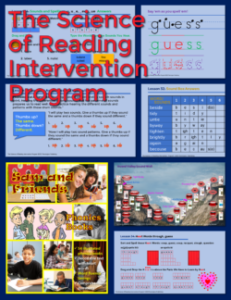Middle School Reading Intervention
If middle school students are non-readers or struggle with simple text, should we teach middle school reading intervention like we teach beginning readers?
Can’t I just use a beginning reading program like UFLI and adapt it to my MS students? They need to learn the same foundational skills?
Such questions are posted in Facebook group posts every day. Almost universally, comments are the same:
I used UFLI last year with my sixth-graders and saw tremendous growth.
If a MS student needs basic skills, you need to teach those basic skills.
2 + 2 =4. If a teenager doesn’t know this, there really isn’t any other way to teach it than you would to a first-grader.

Two schoolgirls and schoolboy (6-12) singing in row, close-up
The last 20 years of my career I served as an MS reading specialist. I certainly agree that MS students need to learn the same “skills” that beginning readers require e.g., segmenting, spelling, blending /c//a//t/, and connecting the word to background (prior and extended) background knowledge. If MSers don’t know it, they need to learn it. BUT…
MSers who struggle with reading and spelling are different than, say, first graders. And this fact should impact both WHAT we teach, and HOW we teach.
Quick examples: MSers have much greater oral language lexicons than primary students, much more advanced knowledge of syntax, more life experience, and different interests. These facts should impact WHAT we teach. So, perhaps /k//ou//g//ar/ instead of /c//a//t/ with passive voice sentence examples, comparisons to panthers, catamounts, mountain lions (synonyms) and related species.e.g., cheetahs, lions, tigers. You get the idea. WHAT we teach should be qualitatively different for struggling MSers than for beginning readers.
In terms of the HOW, MSers should benefit from accelerated instruction. Generally speaking, a MS intervention class ain’t a MSer’s first rodeo. Student may not have mastered the /ou/ in cougar, but they probably have been taught it several times before. Thus, generally speaking, less practice is required than for a 1st grader. This is also true for ML and EL learners. With their language experience, hurried instruction is possible. If the instructional pace is too slow, MSers quickly use interest and attention.
Additionally, we can’t forget to account for the trauma that struggling MS readers face to varying degrees. That PTSD-like trauma should influence our choice of instructional reading resources, our motivational strategies, and our approach to behavior management.

Older Age Decodables
I’ll never forget the teenager at the rear of a reading intervention class, chanting under his breath, /c//a//t/, c-a-t, I am stu-pid. Or seventh graders looking through big-headed childish characters in decodables or practicing sound-spelling cards with cartoonist illustrations of “Tony the Tiger.”
So to end my preaching, before selecting an excellent K-2 word recognition program with hopes of adapting it to the WHAT and HOW needs of upper elementary, middle school, high school, or adult learners… consider another age-appropriate program.
*****
Disclaimer: I’m the author/publisher of a reading intervention program for ages 8-adult. The following link will allow you to access the entire print portion of the program (not the corresponding Google slides): https://penningtonpublishing.com/collections/reading/products

The Science of Reading Intervention Program for Ages 8-Adults